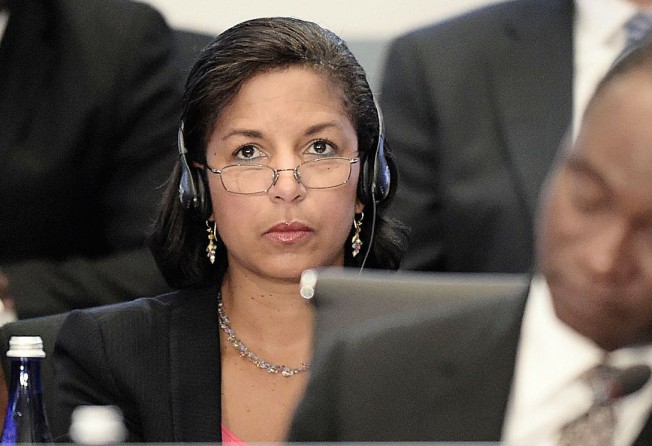US aide Susan Rice heads to China to smooth way for Xi-Obama summit
Terrorism and ways to head off military aircraft collisions tipped to be on agenda of talks between American and Chinese officials

A top foreign policy adviser of US President Barack Obama will visit China on Sunday to try to contain tensions between the two nations ahead of a summit between Obama and President Xi Jinping.
United States National Security Adviser Susan Rice would hold talks with Chinese officials including State Councillor Yang Jiechi during her three-day trip to Beijing, US National Security Council spokeswoman Caitlin Hayden said yesterday.
Rice "will underscore the US commitment to building a productive relationship" with China ahead of Obama's visit to Beijing for the Asia-Pacific Economic Cooperation summit in November, Hayden said.
State Department officials said earlier that Obama would attend the summit on November 10 and 11, and meet Xi the following day. The bilateral meeting may be held in an informal setting similar to the talks between the two leaders at the Sunnylands estate in California last year.
Rice's visit comes as tensions between the two nations continue to simmer, with the US critical of China's assertiveness over territorial disputes in the East and South China seas. In May, Rice described China's move to deploy an oil rig in the disputed South China Sea as "provocative and unhelpful".
China is also increasingly suspicious of the growing US military presence in the Asia-Pacific region. Washington criticised China last month after a Chinese fighter jet had a close encounter with a US Navy surveillance aircraft in international airspace off Hainan province.
Jia Qingguo, a professor of international relations at Peking University, said Rice was expected to discuss ways to avoid collisions between US and Chinese aircraft. Jia said the US would demand Chinese aircraft not go near US aircraft, and Beijing would tell Washington to reduce surveillance of China.
"China is probably willing to have its aircraft stay further away from US [planes] if Washington agrees to scale down surveillance activities," he said. "Neither of the nations wants a collision of military aircraft."
A serious confrontation between the two militaries happened in 2001, when a Chinese pilot was killed after his fighter jet intercepted a US spy plane near Hainan. The US air crew was held captive in China for 11 days until Washington expressed regret.
Renmin University international relations professor Shi Yinhong said neither nation wanted tensions to overshadow the talks between Obama and Xi in November.
"Both nations may want to refrain from open confrontation in the coming two months even though their mutual suspicions will linger," he said.
Jia said cybersecurity and counterterrorism efforts would also be on the agenda as concerns grew about the rise of Islamic State in Iraq and Syria.